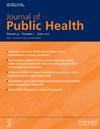主观幸福感中的人口和社会经济不平等:2010-2019 年英格兰重复横断面健康调查分析
IF 3.6
4区 医学
Q1 PUBLIC, ENVIRONMENTAL & OCCUPATIONAL HEALTH
引用次数: 0
摘要
背景良好的主观幸福感(SWB)是社会的一个重要愿望。对主观幸福感决定因素的研究日益受到关注。本研究旨在考察英格兰五个人口(性别和年龄)和社会经济(教育水平、家庭收入和独居)特征方面的主观幸福感的全国性不平等以及这些不平等的趋势。方法 从 2010 年至 2019 年(不包括 2017 年和 2018 年,因为我们的结果变量没有在这两年收集)英格兰健康调查的重复横截面数据中计算出不平等的相对指数(RII)和不平等的斜率指数(SII),共收集了 90 236 名 16 岁以上的参与者。SWB采用沃里克-爱丁堡心理健康量表(WEMWBS)进行评估,作为二分变量处理,SWB的高水平和低水平分别为> 40和≤40。结果 收入(RII 从 1.086 到 1.116)、教育水平(RII 从 0.893 到 0.941)以及独居或非独居人群(RII 从 0.908 到 0.937)之间的 SWB 存在明显的不平等。RII 和 SII 的趋势在统计学上并不显著。结论 较高的社会经济地位可能会对自立能力起到保护作用,而处于最贫困社会经济地位的人可能会有较高的自立能力低下的风险。这些关联随着时间的推移保持稳定。本文章由计算机程序翻译,如有差异,请以英文原文为准。
Demographic and socio-economic inequalities in subjective wellbeing: analysis of repeated cross-sectional health surveys in England 2010–2019
Background Good subjective wellbeing (SWB) is a key societal aspiration. The study of SWB determinants is of increasing interest. The present study aimed to examine national inequalities in SWB, and trends in these inequalities, for England across five demographic (sex and age) and socio-economic (educational level, household income and living alone) characteristics. Method The relative index of inequalities (RII) and slope index of inequalities (SII) were calculated from repeated cross-sectional data from the Health Survey for England from 2010 to 2019 (excluding 2017 and 2018 as our outcome variable was not collected in these years), in a total of 90 236 participants aged 16+. SWB was assessed using the Warwick-Edinburgh Mental Well-being Scale (WEMWBS), treated as a dichotomous variable with high and low levels of SWB > 40 and ≤ 40, respectively. Results There were significant inequalities in SWB by income (RII from 1.086 to 1.116), educational level (RII from 0.893 to 0.941) and between people living alone or not (RII from 0.908 to 0.937). The RII and SII trends were not statistically significant. Conclusions Higher socio-economic status could play a protective role for SWB, and people in the most deprived socio-economic positions may be at higher risk for low SWB. These associations have remained stable over time.
求助全文
通过发布文献求助,成功后即可免费获取论文全文。
去求助
来源期刊

Journal of Public Health
医学-公共卫生、环境卫生与职业卫生
CiteScore
7.40
自引率
2.30%
发文量
120
审稿时长
6-12 weeks
期刊介绍:
Previous Title Zeitschrift für Gesundheitswissenschaften, Previous Print ISSN 0943-1853, Previous Online ISSN 1613-2238.
The Journal of Public Health: From Theory to Practice is an interdisciplinary publication for the discussion and debate of international public health issues, with a focus on European affairs. It describes the social and individual factors determining the basic conditions of public health, analyzing causal interrelations, and offering a scientifically sound rationale for personal, social and political measures of intervention. Coverage includes contributions from epidemiology, health economics, environmental health, management, social sciences, ethics, and law.
ISSN: 2198-1833 (Print) 1613-2238 (Online)
 求助内容:
求助内容: 应助结果提醒方式:
应助结果提醒方式:


